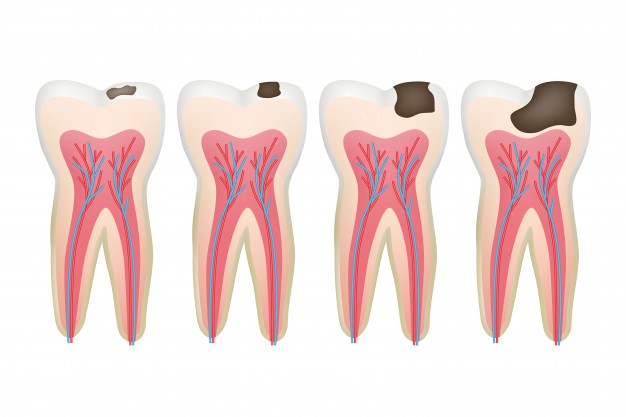Tooth Decay Treatment
Tooth decay treatment involves addressing the damage caused by cavities, which are areas of the tooth that have been eroded by bacterial acids. This condition can lead to pain, infection, and further damage if not treated promptly. The treatment for tooth decay aims to restore the affected tooth to its normal function and prevent further deterioration. Depending on the severity of the decay, treatment may involve cleaning out the decayed area and placing a filling, crown, or other restorative materials to protect and restore the tooth.

*Types of Tooth Decay Treatments*
1. *Dental Fillings*
Dental fillings are used to restore teeth that have been damaged by decay. The decayed portion of the tooth is removed, and the cavity is filled with a material such as composite resin, amalgam, or glass ionomer. Fillings help restore the tooth’s shape and function while preventing further decay.
2. *Dental Crowns*
For more extensive decay where a significant portion of the tooth is damaged, a dental crown may be required. A crown is a custom-made cap that covers the entire tooth, providing strength and protection. It is typically placed after the decayed area has been cleaned and shaped to fit the crown.
3. *Root Canals*
If tooth decay reaches the tooth’s pulp (the innermost part containing nerves and blood vessels), a root canal may be necessary. This procedure involves removing the infected pulp, cleaning and disinfecting the root canals, and then sealing them with a material. A crown is usually placed on the tooth afterward to restore its function and appearance.
4. *Dental Sealants*
Dental sealants are a preventive treatment used to protect the chewing surfaces of the back teeth from decay. A thin, protective coating is applied to the grooves and fissures of the teeth to prevent food particles and bacteria from getting trapped and causing decay.
5. *Fluoride Treatments*
Fluoride treatments can help strengthen tooth enamel and prevent the progression of early tooth decay. Fluoride can be applied in the form of gels, varnishes, or foams, and helps to remineralize areas of the tooth that are starting to decay.
*Who is it Suitable For?*
Tooth decay treatment is suitable for anyone who has cavities or signs of tooth decay. The specific treatment chosen depends on the severity of the decay and the affected tooth’s condition. Patients experiencing symptoms such as tooth sensitivity, pain, or visible cavities should seek treatment promptly to prevent further damage and maintain oral health. Regular dental check-ups are also essential for early detection and prevention of tooth decay.
*Conclusion*
Treating tooth decay effectively restores the health and function of the affected teeth while preventing further complications. Whether through fillings, crowns, root canals, or preventive measures like sealants and fluoride treatments, addressing tooth decay is crucial for maintaining overall oral health and ensuring a healthy, functional smile.

